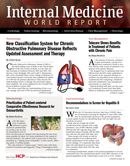New Data Provides Physicians with Confident Weight Loss Recommendations
There is a wide variety of evidence to support benefits of low-fat diets versus low carbohydrate diets and vice versa. As of today, no one can tell us with certainty whether the well-worn dictum "calories in calories out" is really true. The National Weight Control Registry data give us some confidence in recommending that to lose weight most people need to alter their diet to reduce calories, and need to exercise on a near-daily basis.

Simon Douglas Murray, MD
Editor-in-Chief
Have you ever been confused about giving weight loss advice that is meaningful to patients? You wouldn't be alone in that regard, because in fact there is no one superior diet as far as I can tell. There is a wide variety of evidence to support benefits of low-fat diets versus low carbohydrate diets and vice versa. As of today, no one can tell us with certainty whether the well-worn dictum "calories in calories out" is really true. The National Weight Control Registry data give us some confidence in recommending that to lose weight most people need to alter their diet to reduce calories, and need to exercise on a near-daily basis. Keeping a food diary is good advice as is recommending that breakfast shouldn’t be skipped. But to actually make recommendations for specific dietary changes has proved more troublesome in large part due to the conflicting data.
There are dozens of clinical trials comparing the benefits of various diets, but yet they're quite disparate in the results. Two camps have emerged in the nutritional literature: the low fat diet group and the low carbohydrate, low sugar group. There are plenty of claims for the benefits of each of these, but what has been lacking has been good science to help answer these questions.
The longstanding, common reason to explain obesity is that Americans eat too much, especially fat, which contributes to their obesity. This is a position supported by many large medical organizations. However, there is the Atkins diet that claimed that eating excessive amounts of fat had little to do with weight gain or the development of cardiovascular diseases. In recent years, competing theories developed which support some of Atkin’s claims. A growing number of doctors now feel that the increased intake of table sugar and refined carbohydrates is the most likely explanation for our current epidemic. The truth of the matter is we really can’t know for sure because most of our studies are observational, which may show a link between the type of foods that subjects claim to eat and the prevalence of the disease we're studying but does not prove cause and effect.
It is good to note that studies are currently under way. In January, subjects checked into the metabolic ward at the National Institute of Health in Bethesda, MD to participate in one of the most vigorous dietary studies ever devised. The subjects were confined to the unit for 8 weeks at a time. Twice a week they were locked in airtight rooms within metabolic chambers. Scientists determined precisely how many calories were burned by measuring changes in oxygen consumption and the amount of carbon dioxide exhaled. Meals were provided through vacuum sealed portholes so that the researchers’ breathing would not interfere with the measurements. The food was chemically analyzed to ensure an exact number of carbohydrates, protein, and fat. Twice a month, subjects are required to have dual-energy x-ray absorptiometry scans to measure body fat as well sophisticated blood tests on a regular basis. This is one of 3 studies that are being done to carefully analyze food content and energy expenditure. The fact that is being done with private money rather than government money is no more shocking than the basic question it wants to answer: “Do we become fat because of how much we eat, or because of what we eat?”
As not all studies are funded by the government, The Energy Balance Consortium study is one potential study gaining support from another avenue — The Nutrition Science Initiative (NuSI), a nonprofit corporation that funds studies examining previously overlooked hypotheses. The nonprofit organization is run by Gary Taubs and Peter Attia, MD who have raised $40 million so far to fund studies with the ambitious goal of a finding a way to reduce the incidence of diabetes and obesity in the United States by 50% in the next 15 years. They hope to raise 190 million dollars to finance this work.
It is obvious that something different has to be done. Despite our best efforts two thirds of American adults are overweight or obese, 115 million Americans have diabetes or pre-diabetes, and for all the thousands of studies and millions of dollars spent, there is no agreement of experts on what has made us fatter and sicker over the past several decades, or what course of action to take.
Three other studies being sponsored by the consortium include the Boston Children's Hospital study, in which 150 overweight or obese college students are being observed to see whether altering the specific components of a diet affect weight loss. The students all reside in dormitories, and are randomized to 3 diets with varying portions of carbohydrate and fat. They are being monitored very closely and physiologic changes are noted. A second study looks at overweight and obese males aged 18-50 to see if altering the amount of carbohydrates and fat in the diet can cause changes in appetite, in insulin secretion, and in other hormones. After 4 weeks of a standard diet designed to maintain weight, subjects will be switched to a ketogenic diet which contains 80% fat and 5% carbohydrates. In addition to hormone studies, they will be observed to see if they reduce their fat mass more quickly than when following standard diet. The third study, conducted at Stanford University, involves overweight subjects 18-50 years old. It seeks to answer the question of how specific diets in real world situations affect weight loss. The trial is using a smart phone application to help track calories, diet, and energy expenditure over a 12-month period.
It's hard to give dietary advice to people when we actually don't know the right answers. To tell people who want to lose weight, “Avoid white carbohydrates, or never eat any food that is handed to you from a window,” is clever but not very helpful in the long-run. This research will aid us with what has been a losing battle against obesity to date.
Other interesting questions remain unanswered:
Does the timing of calorie intake affect how much weight is lost?
Some of our obese patients swear that they only eat 800 calories and exercise daily but don’t lose weight. How can that be? Our stock answer, often not expressed, is that they are misstating the truth. But is it remotely possible that some people are just really efficient at storing energy? It is logical to assume that modern man evolved from ancestors who were able to survive in periods of prolonged famine. People who lost weight easily died. As long as food was less abundant, or when living required a higher energy expenditure this genetic trait was never expressed. Now, in an era of food excess and limited need to exercise, the gene is fully expressed.
Is it possible that diabetes is a disease of glucose metabolism, as well as, a disease that makes it difficult for some people to lose weight rather than a disease one acquires because of being fat?
Does the theory ‘calories in equal calories out’ apply to human as it does in physics?
Once we have effectively answered those questions, we might have to consider the case for salt, and its relationship to cardiovascular disease, or artificial sweeteners and the risk of diabetes. That’s a story for another day.
